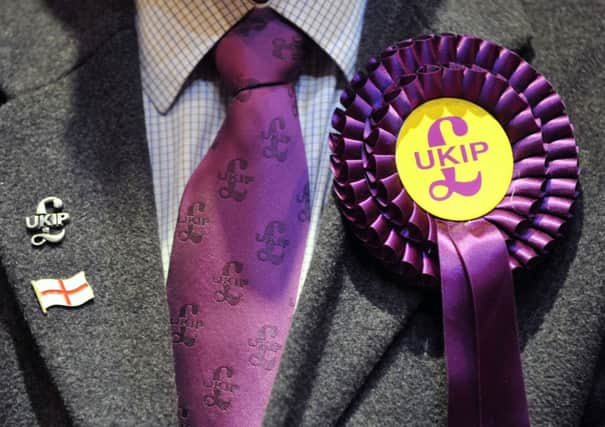Keith Burnett: What students can teach Ukip about identity


Sheffield was chosen partly as the constituency of the pro-European Nick Clegg. But Ukip is also seeking to shift from its historic roots in the Tory south to reach out to northern voters who used to support Labour.
Nigel Farage drove the point home: “We’re in Sheffield. We are some distance away from the Westminster political elite...my guess is that most of you actually will be real people, doing real jobs, who want to bring up their families and be proud to be British.”
Advertisement
Hide AdAdvertisement
Hide AdThe message was meant not just for the people of Sheffield. This language of national identity and “pride” has a powerful appeal across British politics.
There are Farage-type political figures all over Europe, but flags are emotive symbols and we have to be careful what they stand for.
I’ve been reading this week about the ideas of “homeland” in history. What I’m learning makes me reflect on how we can sometimes use our perceptions of what we are to exclude others from our “family”.
This has made me reflect on the importance of the scholars at Sheffield who work to understand the formation of states, languages and our identities. But it is not only our academics who have seen this coming and who question the terms of the debate. It is also our students who bring with them the experience and insights of over 100 countries.
Advertisement
Hide AdAdvertisement
Hide AdOur university is a place which speaks up for, and welcomes, our proudly international community. Our home students, overseas students and staff are telling those who may be wary of migration even for education that “we are all international students”. They are saying loud and clear that they will “stand by” their friends and colleagues from other countries.
I am deeply proud of our Sheffield students, who are determined to build on what binds us together, rather than what separates us. Our #weareinternational campaign has the support of over 100 universities and institutions such as the British Council and the Confederation of British Industry. We have not stayed silent at a time when we needed to speak up for a better vision of what it means to be a university, proud both to be in the UK and rooted in the well-being of the citizens of Sheffield.
Without diminishing genuine concerns over real issues, the politicians and pundits who come to Sheffield need reminding of other home truths. We can demonstrate that international students for example contribute 10 per cent of the city’s inward investment. If they were to leave – as well as leaving our university and our lives so much the poorer – it would be jobs and incomes in Sheffield, not Westminster, which would be lost.
And it is not only spending power. Immigrants start one in seven companies in the UK. I have a global family of science colleagues who I admire deeply and I remain an international student of physics.
Advertisement
Hide AdAdvertisement
Hide AdBut there are other aspects of what I am. By adoption, I am now a proud Yorkshireman. I am proud to have been born and raised in Rhondda Valley – a fellow of the Learned Society of Wales. I’m proud of my Scots name and heritage. I’m proud to be a citizen of the European Union.
Yet we must all be careful of the images of home which sit alongside our personal flags or badges of identity. We need to stay aware of what or who we might unwittingly exclude and at what cost. We need to stay open to the knowledge and experience which may reside in someone different from ourselves, or in the unique combination of strengths only released when we blend our insights.
Our International Officer Alex Kohnert gave a wonderful speech at a recent House of Commons event in which he said: “We are literally changing lives. When you bring students to new places, to learn, to study, to grow as people, you change the direction of their future. And when they go back to their countries, you change the direction of countries.
“The transformational power of education is without parallel in the world. These issues don’t just matter to international students, they matter to students from the UK too. No one person or country in this modern world can afford to be an island. We are one community. So we are standing by our international students, and we are willing to fight for them when they are challenged.”
Advertisement
Hide AdAdvertisement
Hide AdNigel Farage claims his campaign is making the “chattering classes” outraged because he dares to speak the truth. But Alex’s voice was every bit as direct and moving as that of an experienced political orator and it needed to be heard.
Professor Sir Keith Burnett is vice-chancellor of the University of Sheffield.